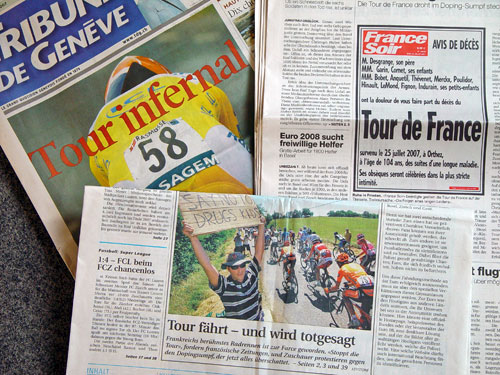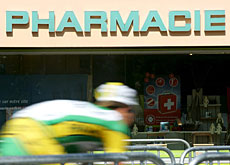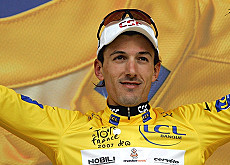Tour de France ends saddled by doping

The premier event in the cycling calendar, the Tour de France, ended on Sunday with victory for Spain's Alberto Contador, but doping clearly overshadowed the race.
Despite this, cycling continues to fascinate the public. Although nearly three-quarters of Swiss believed the majority of riders resorted to doping, 55 per cent continue to show an interest in the Tour.
The high point for Switzerland in an event marred by scandal, controversy, lies and suspicion was the early performance of Swiss rider Fabian Cancellara, who won the 7.9 km prologue in London and Stage Three from Waregm (Belgium) to Compiègne in France (236.5 km).
Cancellara, who held the yellow leader’s jersey for eight days, finished seventh in the final 146 km stage from Marcoussis to Paris but 100th overall.
Cadel Evans of Australia and Levi Leipheimer of the United States came second and third behind Cantador in the overall standings of the 94th Tour, described by some observers as the “Tour de Farce”.
Contador had seemed destined for second place until the Tour was hit by a bombshell just five days from the finish – the withdrawal of race leader Michael Rasmussen. His Rabobank team accused the Dane of having lied about his whereabouts before the Tour to evade doping controls.
Circus
The Tour turned into a circus after it emerged that Rasmussen was competing despite missing doping controls in May and June, and after Kazakh star Alexandre Vinokourov – a pre-race favourite to win – and Cristian Moreni of Italy failed doping tests.
They and their teams left the race, and police raided their hotels in the search for doping products.
An opinion poll published in the SonntagsZeitung newspaper showed that 72 per cent of Swiss believed that the majority of Tour riders resorted to doping tactics.
In a survey of more than 500 people in the German- and French-language regions of the country, 77 per cent wanted stricter controls and harsher punishment for doping.
But only 51 per cent thought that cycling had a bigger problem with doping than other sports, such as athletics or cross-country skiing.
A slightly larger majority – 57 per cent – believed cycling had a future, whereas 35 per cent felt the opposite.
Olympic cycling ban?
In a related development, the issue of banning cycling from the Olympics has also been in the news after remarks on Friday by a Swiss member of the International Olympic Committee, René Fasel.
The president of the IOC, Jacques Rogge, rejected the idea of a ban but other officials, including Fasel, are impatient at the spiralling doping problems.
“If cycling doesn’t resolve this problem, I’d go as far as saying it should be excluded from the Olympics,” Fasel told the Associated Press.
“Just tell them ‘no more.’ It’s discrediting all those who are honest and clean. The heads of cycling need to know that if they don’t clean up the sport, and really clean it up, then it’s goodbye.”
Anti-doping agency
In another move related to doping, Swiss Olympic – the umbrella organisation of sport in Switzerland – has said it wants to speed up the creation of a national anti-doping agency. It wants the agency to be set up in 2009, rather than in 2011 as foreseen.
According to the NZZ am Sonntag newspaper, Swiss Olympic wants to add an extra SFr500,000 ($413,701) to the SFr1.5 million already budgeted for the fight against doping.
In an initial phase, all important activities that concern doping are to be brought under one roof. At present both the Swiss Olympic Association and the Federal Sports Office handle anti-doping issues.
The World Anti-Doping Agency has called for such an organisation, and the majority of European countries have complied with the demand.
swissinfo with agencies
Doping cases abounded on this year’s Tour De France.
July 18: Germany’s Patrik Sinkewitz was the first rider to test positive after a testosterone examination made on June 8.
July 24: Alexandre Vinokourov was forced out of this year’s Tour, along with all members of the Astana team after he tested positive for a banned blood transfusion. The Kazakh rider, a one-time favourite to win cycling’s premier event, was tested after his victory in the 13th stage time trial.
July 25: Michael Rasmussen of Denmark – the overall leader – was removed from the race by his Rabobank team after winning a stage, The expulsion, which was ordered by the Dutch team’s sponsor, was linked to “incorrect” information that Rasmussen gave to the team’s sports director over his whereabouts last month. He also missed random drugs tests by the International Cycling Union.
On the same day, Cofidis confirmed that its rider Christian Moreni of Italy had failed a doping test, prompting the withdrawal of the entire Cofidis team.

In compliance with the JTI standards
More: SWI swissinfo.ch certified by the Journalism Trust Initiative



You can find an overview of ongoing debates with our journalists here. Please join us!
If you want to start a conversation about a topic raised in this article or want to report factual errors, email us at english@swissinfo.ch.